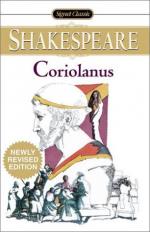|
This section contains 7,500 words (approx. 25 pages at 300 words per page) |

|
SOURCE: Bligh, John. “The Mind of Coriolanus.” English Studies in Canada 13, no. 3 (September 1987): 256-70.
In the following essay, Bligh highlights Coriolanus's unswerving devotion to a set of aristocratic ideals that eventually contribute to his undoing.
Coriolanus is no philosopher, but in his life he tests out two distinctive ways of thinking and acting, which later philosophers have systematized into philosophies. His mother initiates him in both, first in an aristocratic (Platonic) idealism, and later in an amoral (Machiavellian) realism. In both cases he betters her instruction, puts it to the test of experience, and finds it wanting. The first brings him to the brink of the Tarpeian rock; the second makes his corpse the footstool of his enemy.
Many people in the play (and quite a few modern critics1), think that Marcius is by nature a proud, irascible, unsociable person, and that his professed patriotism is false. “I...
|
This section contains 7,500 words (approx. 25 pages at 300 words per page) |

|


